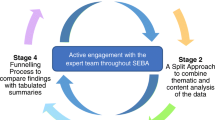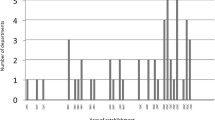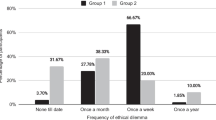Abstract
To achieve accreditation standards and train residents for clinical practice, ACGME placed a lot of emphasis on ethical competence and professionalism. A crucial requirement for enhancing the standard of future medical practice is ethics education. This study sought to identify the requirement for ethics knowledge in clinical training from the perspective of the residents and determine the most effective methods for education. A cross-sectional descriptive study was conducted between March and May 2023. Participants included Lebanese postgraduate medical students, 210 completed a Google Forms survey via WhatsApp. A validated questionnaire adapted from a previous study was used, focusing on demographics, ethical experience, attitudes, educational goals, and training effectiveness. Analyses were performed on IBM SPSS Statistics software (version 26.0) and R software. 210 residents representing a range of specialties participated in the survey. predominantly in internal medicine (54.8%). Residents strongly affirmed the importance of professionalism and ethics education. Participants overwhelmingly agreed that it should improve patient care and clinical decision-making (p < 0.05). The best way to learn is also through clinical rounds, which feature peer discussion groups facilitated by experienced physicians (p < 0.001). Topics identified as needing more attention were obtaining informed consent and discussing treatment risks(p < 0.05). In order to develop the best teaching strategies for the trainees and produce the most competent doctors possible in the future, this study shed light on the ethical weak points in the clinical training of residents. and lay the groundwork for establishing an ethical curriculum to direct future medical practice.





Similar content being viewed by others
References
Accreditation Council for Graduate Medical Education. 2021. ACGME program requirements for graduate medical education in internal medicine. … E At Http://Www.Acgme.Org/… (1): 1–35. http://www.acgme.org/acgmeweb/Portals/0/PFAssets/2013-PR-FAQ-PIF/140_internal_medicine_07012013.pdf.
ACGME-I. 2022. Accreditation Council for Graduate Medical Education - International. Requirements and Process Overview 11(1): 2–4.
Andersson, Henrik, Anders Svensson, Catharina Frank, Andreas Rantala, Mats Holmberg, and Anders Bremer. 2022. Ethics education to support ethical competence learning in healthcare: An integrative systematic review. BMC Medical Ethics 23(1): 1–26. https://doi.org/10.1186/s12910-022-00766-z.
Arawi, Thalia. 2010. The Lebanese physician: A Public’s viewpoint. Develo** World Bioethics 10(1): 22–29. https://doi.org/10.1111/j.1471-8847.2009.00258.x.
Blank, Linda, Harry Kimball, Walter McDonald, and Jaime Merino. 2003. Medical professionalism in the new millennium: A physician charter 15 months later. Annals of Internal Medicine 138(10): 839–841. https://doi.org/10.7326/0003-4819-138-10-200305200-00012.
Bowsher, Gemma, Laura Parry-Billings, Anna Georgeson and Paula Baraitser. 2018. Ethical learning on international medical electives: A case-based analysis of medical student learning experiences. BMC Medical Education 18(1): 1–9. https://doi.org/10.1186/s12909-018-1181-7.
Bremer, Anders and Mats Holmberg. 2020. Ethical conflicts in patient relationships: Experiences of ambulance nursing students. Nursing Ethics 27(4): 946–959. https://doi.org/10.1177/0969733020911077.
Cummings, Christy L. 2016. Teaching and assessing ethics in the newborn ICU. Seminars in Perinatology 40(4): 261–269. https://doi.org/10.1053/j.semperi.2015.12.016.
den Boer, M., A. C., J. M. Zanin, Latour, and J. Brierley. 2022. Paediatric residents and fellows ethics (PERFEct) Survey: Perceptions of European trainees regarding ethical dilemmas. European Journal of Pediatrics 181(2): 561–570. https://doi.org/10.1007/s00431-021-04231-8.
Doolittle, Benjamin R., Daniel Tobin, Inginia Genao, Matthew Ellman, Christopher Ruser and Rebecca Brienza. 2015. Implementing the patient centered medical home in residency education. Education for Health: Change in Learning and Practice 28(1): 74–78. https://doi.org/10.4103/1357-6283.161916.
Emery, Alan E. H. 2013. Hippocrates and the oath. Journal of Medical Biography 21(4): 198–199. https://doi.org/10.1177/0967772013513395.
Gantayet-Mathur, Arpita, Karenn Chan and Meena Kalluri. 2022. Patient-centered care and interprofessional collaboration in medical resident education: Where we stand and where we need to go. Humanities and Social Sciences Communications 9(1): 1–24. https://doi.org/10.1057/s41599-022-01221-5.
Ghamri, Ranya A. and Rajaa M. Al-Raddadi. 2017. Assessment of perceived needs and preferences with regard to the education of residents in medical ethics in King Abdulaziz University Hospital. Journal of Family and Community Medicine 24(3): 189–195. https://doi.org/10.4103/jfcm.JFCM_34_17.
Goodrich, Thelma Jean, Craig A. Irvine and Daria Boccher-Lattimore. 2005. Narrative ethics as collaboration: A four-session curriculum. Families Systems and Health 23(3): 348–357. https://doi.org/10.1037/1091-7527.23.3.348.
Hammond, Katherine A. Green, Cynthia M. A. Geppert, Teddy Warner, Laura W. Roberts and Thomas W. Heinrich. Becoming a good doctor: Perceived need for Ethics Training focused on practical and professional development topics. Academic Psychiatry 29(3): 301–309.
Helft, Paul R., Rachael, E. Eckles and Laura Torbeck. 2009. Ethics education in surgical residency programs: A review of the literature. Journal of Surgical Education 66(1): 35–42. https://doi.org/10.1016/j.jsurg.2008.10.001.
Hong, Daniel Zhihao, Jia Ling Goh, Zhi Yang Ong, Jacquelin Jia Qi Ting, Mun Kit Wong, Jiaxuan Wu, ** review. BMC Medical Education 21(1). https://doi.org/10.1186/s12909-021-02644-5.
Koo, Ok Hee, Young Mi Ryu and Myung Sook Kim. 2018. Effects of ethics education on ethical values in nursing students. Journal of Engineering and Applied Sciences 13(2): 2903–2908. https://doi.org/10.3923/jeasci.2018.2903.2908.
Kuhn, Eva, Laura Lunden, Penelope Moysich, Kai Rogge, Marijke Roscher, Lotta Caning and Annette Rogge. 2021. Ethik first – extracurricular support for medical students and young physicians facing moral dilemmas in hospital routine. GMS Journal for Medical Education 38(4): 1–15. https://doi.org/10.3205/zma001470.
Lee, Chunbok, Sunman Kim, Kwisoon Choe and Sunghee Kim. 2021. Effect of ethics seminar on moral sensitivity and ethical behavior of clinical nurses. International Journal of Environmental Research and Public Health 18(1): 1–7. https://doi.org/10.3390/ijerph18010241.
Lehmann, Lisa Soleymani, Wilard S. Kasoff, Phoebe Koch and Daniel D. Federman. 2004. A survey of medical ethics education at U.S. and canadian medical schools. Academic Medicine 79(7): 682–689. https://doi.org/10.1097/00001888-200407000-00015.
Lehmann, Lisa Soleymani, Lois Snyder Sulmasy and Sanjay Desai. 2018. Hidden curricula, ethics, and professionalism: Optimizing clinical learning environments in becoming and being a physician: A position paper of the American College of Physicians. Annals of Internal Medicine 168(7): 506–508. https://doi.org/10.7326/M17-2058.
Lown, Beth A., Martha E. Gaines, Sharrie McIntosh, Kathy McGuinn and David S. Hatem. 2016. Integrating compassionate, collaborative care (the ‘Triple C’) into health professional education to advance the triple aim of health care. Academic Medicine 91(3): 310–316. https://doi.org/10.1097/ACM.0000000000001077.
Milestones, Medical, Communication Knowledge, Practice-based Skills, Learning, and Systems-based Practice. 2014. The neurology milestone project. Journal of Graduate Medical Education 6(1s1): 105–115. https://doi.org/10.4300/jgme-06-01s1-33.
Nunnally, J. and I. Bernstein 3rd. 1994. Psychometric theory, 3rd edn. New York: McGrawHill
Roberts, Laura Weiss, Katherine A. Green Hammond, Cynthia M. A. Geppert and Teddy D. Warner. 2004. The positive role of professionalism and ethics training in medical education: a comparison of medical student and resident perspectives. Academic Psychiatry 28(3): 170–182. https://doi.org/10.1176/appi.ap.28.3.170.
Roberts, Laura Weiss, Cynthia M. A. Geppert, Teddy D. Warner, Katherine A. Green Hammond and Leandrea Prosen Lamberton. 2005. Bioethics principles, informed consent, and ethical care for special populations: Curricular needs expressed by men and women physicians-in-training. Psychosomatics 46(5): 440–450. https://doi.org/10.1176/appi.psy.46.5.440.
Sánchez-Izquierdo, Macarena, Marta Santacreu, Ricardo Olmos, and Rocío Fernández-Ballesteros. 2019. A training intervention to reduce paternalistic care and promote autonomy: A preliminary study. Clinical Interventions in Aging 14: 1515–1525. https://doi.org/10.2147/CIA.S213644.
Shamim, Muhammad Shahid, Adrienne Torda, Lubna A. Baig, Nadeem Zubairi, and Chinthaka Balasooriya. 2021. Systematic development and refinement of a contextually relevant strategy for undergraduate medical ethics education: a qualitative study. BMC Medical Education 21(1): 1–12. https://doi.org/10.1186/s12909-020-02425-6.
Svensson, Anders, Anders Bremer, Andreas Rantala, Henrik Andersson, Scott Devenish, Julia Williams and Mats Holmberg. 2022. Ambulance clinicians’ attitudes to older patients’ self-determination when the patient has impaired decision-making ability: A Delphi study. International Journal of Older People Nursing 17(2): 1–14. https://doi.org/10.1111/opn.12423.
Torabi, Mohammad, Fariba Borhani, Abbas Abbaszadeh and Foroozan Atashzadeh-Shoorideh. 2020. Barriers to ethical decision-making for pre-hospital care professionals. Nursing Ethics 27(2): 407–418. https://doi.org/10.1177/0969733019848044.
Vergano, Marco, Giuseppe Naretto, Fabrizio Elia, Enrico Gandolfo, Chiara Nebris Calliera, and Giuseppe R. Gristina. 2019. ELS (ethical life support): A new teaching tool for medical ethics. Critical Care 23(1): 3–5. https://doi.org/10.1186/s13054-019-2474-x.
Author information
Authors and Affiliations
Corresponding author
Additional information
Publisher’s Note
Springer Nature remains neutral with regard to jurisdictional claims in published maps and institutional affiliations.
Rights and permissions
Springer Nature or its licensor (e.g. a society or other partner) holds exclusive rights to this article under a publishing agreement with the author(s) or other rightsholder(s); author self-archiving of the accepted manuscript version of this article is solely governed by the terms of such publishing agreement and applicable law.
About this article
Cite this article
Kanso, A., Farfour, I., Mansour, P. et al. Ethics training as a crucial scope in the various specialties of the medical residency. International Journal of Ethics Education (2024). https://doi.org/10.1007/s40889-024-00192-2
Accepted:
Published:
DOI: https://doi.org/10.1007/s40889-024-00192-2




